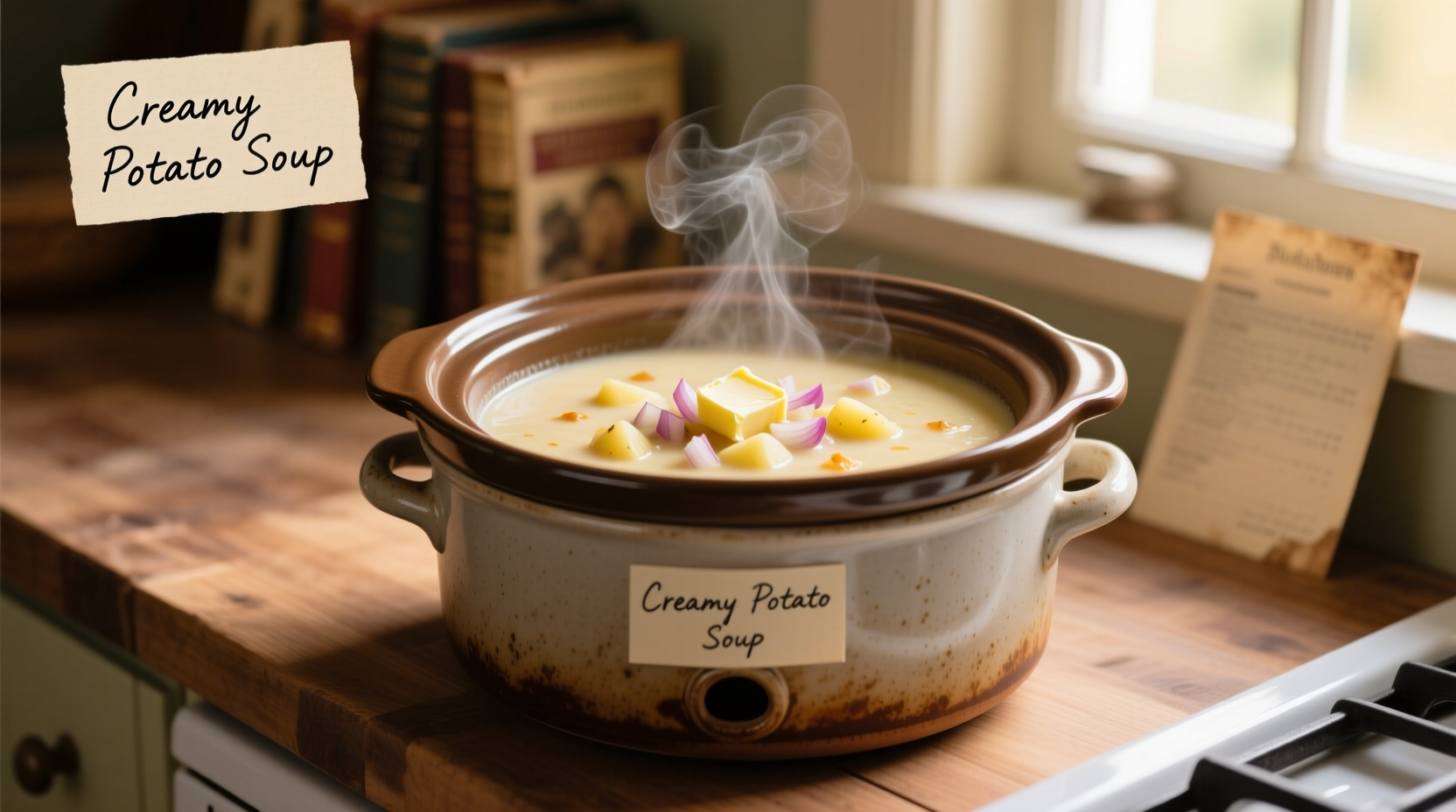Get a perfectly creamy, flavorful potato soup with minimal effort using your slow cooker. This tested recipe delivers rich texture in 6 hours with just 10 minutes of prep time. Key to success: use russet potatoes for ideal starch content and add dairy at the very end to prevent curdling.
There's nothing quite like coming home to the comforting aroma of potato soup simmering all day. Slow cooker potato soup transforms humble ingredients into a velvety masterpiece with almost no hands-on time. Unlike stovetop versions that require constant attention, the slow cooker method develops deeper flavors while you go about your day.
Why Slow Cooker Beats Stovetop for Potato Soup
Food science confirms that low-and-slow cooking creates superior potato soup texture. The gentle heat prevents potatoes from breaking down too quickly while allowing flavors to meld completely. According to USDA food safety guidelines, slow cookers maintain temperatures between 170°F and 280°F - perfect for developing complex flavors without scorching.
| Cooking Method | Hands-On Time | Flavor Development | Texture Consistency |
|---|---|---|---|
| Slow Cooker | 10 minutes | Deep, layered flavors | Perfectly creamy without gluey texture |
| Stovetop | 30+ minutes | Good but less complex | Risk of uneven cooking or scorching |
Ingredient Selection: What Makes the Difference
Not all potatoes behave the same in slow cooking. Russet potatoes contain higher starch content that breaks down beautifully over long cooking times, creating natural creaminess without excessive dairy. Yukon Golds work well too but produce a slightly waxier texture. Avoid red potatoes which maintain too much structure for creamy soup.
Broth quality matters significantly. University of Illinois Extension research shows that homemade broth contains 20% more gelatin than store-bought, enhancing mouthfeel. If using store-bought, choose low-sodium versions to control seasoning.

Step-by-Step Cooking Process
Prep phase (10 minutes): Peel and dice 2 pounds russet potatoes into 1/2-inch cubes. The uniform size ensures even cooking. Chop 1 large yellow onion and 3 celery stalks. Mince 2 garlic cloves - don't skip this step as raw garlic added at the end creates unpleasant sharpness.
Layering technique: Place potatoes at the bottom of your slow cooker, then add onions and celery. This prevents delicate vegetables from overcooking. Pour 4 cups broth over ingredients, then add 1 teaspoon dried thyme, 1 bay leaf, and 1/2 teaspoon black pepper.
Cooking timeline:
- First 4 hours: Potatoes begin breaking down, releasing starch that thickens the broth
- Hours 4-5: Flavor compounds from vegetables fully infuse the liquid
- Final hour: Texture reaches ideal creaminess without becoming gluey
Critical finishing step: After 6 hours on LOW, remove bay leaf. Use an immersion blender for 15 seconds to achieve perfect texture - don't over-blend. Stir in 1/2 cup heavy cream or whole milk off heat to prevent curdling. Acidic ingredients like vinegar or wine should be added at this stage to brighten flavors.
Customization Options That Actually Work
Dairy-free version: Replace cream with 1/2 cup unsweetened cashew milk. The natural fats mimic dairy's richness without separation issues. Add 1 tablespoon nutritional yeast for cheesy depth.
Loaded potato soup: For restaurant-style results, add 4 slices cooked bacon (crumbled) and 1/2 cup shredded sharp cheddar during the last 30 minutes. The slow cooker's gentle heat prevents cheese from becoming stringy.
Dietary adaptations: For gluten-free versions, ensure your broth is certified GF. For lower carb options, replace half the potatoes with peeled turnips which have similar texture but fewer carbs.
Troubleshooting Common Issues
Soup too thin? Mix 2 tablespoons cornstarch with 2 tablespoons cold water. Stir into soup and cook on HIGH for 20 minutes. Avoid flour which can create lumps in slow cookers.
Soup too thick? Add 1/2 cup warm broth and stir well. The soup will continue thickening as it cools, so aim for slightly thinner consistency than desired.
Bland flavor? Brighten with 1 tablespoon lemon juice or apple cider vinegar. The acid balances richness without making the soup taste sour. Add 1/4 teaspoon smoked paprika for depth.
Dairy curdling? This happens when dairy hits temperatures above 180°F. Always remove soup from heat before adding dairy, and use room-temperature cream. Never add dairy during cooking cycle.
Storage and Reheating Instructions
Cool soup completely before storing in airtight containers. Properly stored, it keeps for 4 days in the refrigerator or 3 months frozen. When reheating, add a splash of broth as the soup thickens when chilled. Microwave in 30-second intervals stirring between, or reheat gently on stove over medium-low heat.











 浙公网安备
33010002000092号
浙公网安备
33010002000092号 浙B2-20120091-4
浙B2-20120091-4